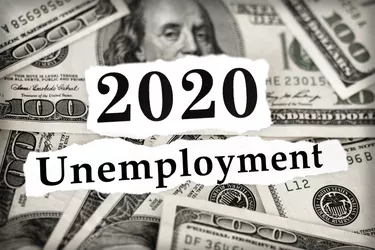
Whether you get unemployment benefits due to COVID-19 or a regular job separation, initially qualifying doesn't necessarily guarantee that you'll continue to receive benefits each week. If you get a notice that the state has suspended your benefits, it usually comes down to a question of eligibility. This can include concerns about suspected fraud, your status as a worker, your ability to return to regular employment or a lapse in following your state's requirements for maintaining benefits. When this happens, know that you have the option to file an appeal.
Failure to Follow State Procedures
Video of the Day
Once your state has deemed you eligible for unemployment benefits, you have to closely follow their requirements to avoid suspension. Typically, this has included registering as available for work with your state's employment service, applying for a specific number of jobs each week and documenting your work search. However, many states such as Iowa, Maine and Maryland have temporarily relaxed such work search requirements during the COVID-19 crisis. This is due to difficulty finding work amidst layoffs, closures and health concerns.
Video of the Day
However, states do still have a weekly or biweekly requirement to report any money you've earned while receiving unemployment benefits. If you fail to keep up with these regular claims, you'll find your benefits suspended and may have to reapply for future benefits.
Dispute Over Reason for Unemployment
You might find your unemployment benefits suspended if your employer presents evidence that your separation didn't qualify or if your state finds you otherwise ineligible. To receive unemployment benefits, your job loss or reduction needs to be of no fault of yours, and this can include general company layoffs and reduced hours due to slow business. While state procedures vary, they've often expanded eligibility for COVID-19 causes such as needing to quarantine or care for family members due to school closures or illness.
You usually won't get to receive benefits if you've gotten fired due to misconduct or simply quit your job for no reason. You'd likely need to prove that you had no choice but to quit due to issues like harassment, discrimination, poor work conditions or a health condition that limits the roles you can work. If you were fired, you'd have to show that a "just cause" such as poor work performance or attendance wasn't the reason. Otherwise, you could lose benefits.
Change in Status and Earnings
Since unemployment benefits are meant to help you temporarily until you can work again, you can have your benefits suspended if your state determines you won't be able to return to work. If you've become permanently disabled and don't anticipate returning to regular employment, then you would likely need to seek benefits through another program.
At the same time, you can lose benefits or see reductions if you get pay from another source and make too much to continue receiving benefits. For example, maybe you got severance or vacation pay from the job that laid you off, or your side income exceeds the maximum amount to receive benefits.
Refusal to Return to Work
You can get your unemployment benefits suspended if you refuse to return to work when you get offered the option. For example, if your job laid you off due to COVID-19, you'll usually need to return to work when asked unless you qualify for a reason such as being sick with the virus or having to care for a household member with it. In normal times, states usually also require you to not reject suitable job offers or else risk losing benefits.
Suspected Unemployment Benefit Fraud
Committing some form of unemployment benefit fraud can at least get your benefits suspended and even lead to fines and jail time in some cases. This can include things like understating your income on your weekly or biweekly claim, lying about how you lost your job, providing false information about yourself or not paying back overpayments promptly.
Filing an Appeal for Benefits
When you get a notice of suspension of benefits, your state should provide information on how to file an appeal and requalify if possible. This often means mailing or faxing an appeal form with some personal information and an explanation for why you disagree with the suspension. Reach out to your state unemployment's hotline or website to get help with your claim.